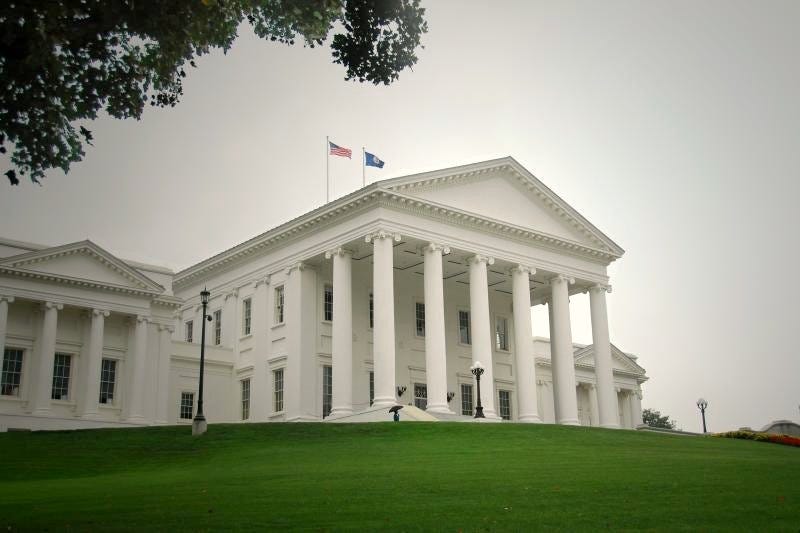Saving distressed cities from themselves
Virginia’s proposed law for fiscally distressed cities takes an aggressive stance.

Happy weekend, readers! At the end of last week’s newsletter, I mentioned a city in Virginia that had similarities to Chester, Pennsylvania’s, management issues. Hopewell, which sits about 22 miles south of Richmond, has been in a financial freefall for years but the majority of local elected officials there are rebuffing the state’s offers for help.
The issues in Hopewell deserve a deeper dive so this week, I’ll explain the main themes and conflicts, how the state’s proposed fiscal monitoring system compares with other state takeover laws, and an alarming financial flag in Hopewell. Hat tip to Bill Atkinson of the Petersburg Progress-Index, who’s Hopewell reporting I have relied upon heavily.
Hopewell’s slide into distress
Like Chester, Hopewell is a poor city with an industrial history. Its population exploded during World War I when DuPont opened the largest gun cotton plant in the world. Unlike Chester, its population never dropped off dramatically from its peak after Dupont left as other industries, such as artificial silk and chemical manufacturing filled the void.
The problems Hopewell has had getting its financial house in order also mirror Chester’s. The city of about 23,000 has had management problems for nearly a decade, such as:
Staff turnover, including the finance director and city manager,
All three major rating agencies withdrew their credit rating by 2018,
It hasn’t submitted a “clean” audited financial report to the state since 2014.
Opinions from the CPAs hired to review the 2015-18 reports found “material discrepancies in cash transactions” between the city school’s financial records and the city treasurer’s records.
Read more
A Small City’s Financial Crisis Leaves Virginia at a Loss (Mark Joffe/Cato Institute)
'Bigger than any one locality': Fiscal-distressed locality bill clears Senate committee (Petersburg Progress-Index via Yahoo News)
In 2023, the city’s audits problem caught the attention of the Virginia auditor of public accounts who classified Hopewell as distressed. The state then paid for an independent audit firm to evaluate and make recommendations to fix the city’s financial controls. City councilors said the state should also pay to help implement those suggestions, so state Finance Secretary Stephen Cummings got the administration’s approval to offer $200,000—as long as the city reopened its search for a new city manager. Local officials, who were set to approve the interim manager for the job, rebuffed that offer, prompting Cummings to refer to Hopewell’s finances as “a five-alarm fire.”
Instead, Hopewell hired The Robert Bobb Group, a turnaround firm with experience helping other Virginia cities, and to-date has approved up to $1.8 million for that contract. The firm says it will have the city’s financial reports current by August 2024.
An aggressive state intervention
Meanwhile, the region’s representatives in the state legislature have proposed a fiscal distress monitoring system that, among other things, allows the state to take an earlier and more active role in monitoring local finances and identifying distressed cities.
House Bill 655 and Senate Bill 645 expand upon the existing system for classifying a fiscally distressed locality to include (among other things): an inability to pay its bills, manage its cash flow, run deficits, chronic billing and revenue collection problems, and missing the 18-month deadline to submit audited annual financial reports.
“This is a way for the state to help earlier, instead of waiting until things get really bad for citizens, as they did in Petersburg,” bill sponsor Del. Carrie Coyner, R-Chesterfield told the Progress-Index. Her district includes Hopewell and is bordered by nearby Petersburg. (State Sen. Lashrecse Aird, D-Petersburg, sponsors the Senate version.)
But regular readers of this newsletter know that it’s difficult—if not impossible—to help localities that rebuff state efforts.
Chester was designated a fiscally distressed city almost 30 years ago and little progress was made for two decades, largely because local officials were not interested in the state’s help. When former state legislator Thaddeus Kirkland became mayor in 2017, the relationship changed to one of mild cooperation with state coordinators. But in 2020 when the governor appointed a receiver to handle the city’s finances, the walls went back up.
Read more from my reporting
When States Take Over Financially Troubled Local Governments
The three-year fight over who's in charge of a bankrupt city
Compared with other laws that create a path for state takeovers, Virginia’s proposal is one of the most aggressive in dealing with local officials. Specifically:
It mandates local cooperation with the state auditor, or risks automatic classification as distressed,
Reports from a state-appointed intervention team assigned to a distressed municipality must “specifically address the degree of cooperation” from local officials,
If a “locality is either unwilling or unable to comply” with the intervention team’s recommendations, an emergency fiscal manager will be appointed,
Following that appointment, local officials “shall not exercise” any powers of their office “directly or indirectly relating to the locality’s finances…and shall be subject to any conditions required by the emergency fiscal manager.”
These powers are similar to Michigan’s emergency manager law, which says, “the governing body and the chief administrative officer of the local government shall not exercise any of the powers of those offices except as may be specifically authorized in writing by the emergency manager.” North Carolina also has an aggressive local intervention law, which allows the state’s Local Government Commission to “impound the books and records of the city and assume full control of all its financial affairs.”
Pennsylvania’s law directs local officials to adopt and implement the state coordinator’s recovery plan and if they don’t, the governor can declare a fiscal emergency and appoint a city receiver. While the law says the state can exercise its “sovereign and plenary police power in emergency fiscal conditions” when local officials are uncooperative, it’s short on specifics regarding local cooperation under receivership. It calls for the city receiver to submit a financial recovery plan to the state court—but it also allows local officials legal recourse to object to that plan.
State takeovers and protecting residents from harm
A commonality with all the fiscal distress laws I’ve reviewed is that decisions are to be made for the sake of the health, safety and well-being of residents. When a locality is chronically unable to manage its finances, it endangers vital public services and puts residents at risk.
But state takeovers can go horribly wrong. In Michigan, studies have shown that the wide-ranging authority of the emergency manager law and the resulting lack of accountability of the manager in place in 2014 contributed directly to Flint’s devastating water crisis.
This is a worst-case scenario, but it shouldn’t be dismissed as an extreme. The fear that an outsider will strong-arm duly elected local officials and subvert the will of the people is a legitimate one. The key here is accountability. Virginia’s law requires an emergency manager to submit regular reports to state and local entities, which is one mechanism for accountability.
Sadly, the more common scenario is that residents suffer harm due to local officials’ inability (or unwillingness) to make the tough decisions that a fiscal crisis requires. Emergency response times tick upward, garbage litters the streets because trash pickup is unreliable, libraries and community centers operate on shortened hours—you get the point. I haven’t done a deep dive into Hopewell’s long-term financial trends, but I did stumble upon one datapoint that suggests residents here have increasingly been paying for the city’s fiscal woes.
Fines and forfeitures are a highly regressive form of revenue that most hurts those who can least afford it and perpetuates a cycle of poverty. They’ve exploded in Hopewell.
Just as concerning is that the budgeted expectations for fines revenue went from consistently less than $200,000 to suddenly $531,500 in 2011. Thereafter, the expected revenue has typically topped $1.4 million.
Until I dive more into the specifics here, I can only guess at what’s happening. But it seems pretty clear that Hopewell’s residents are increasingly bearing their city’s fiscal burden.
UPDATE (Feb. 13): I did some searching and it turns out Hopewell is known for its “Million Dollar Mile,” a section of I-295 that gained notoriety in 2012 for the substantial revenue it generated in fines and citations. Virginia passed a speed trap law in 2015 that capped the revenue for towns like Hopewell at 30%. Even so, fines revenue remains high—in 2019, it topped $1.2 million.
Dive in
What court fees and predatory lenders have in common (LSS archives)
Addicted to Fines: A Special Report (Mike Maciag/Governing)
“Governments are relying more on fines and fees” (GFOA/Rethinking Revenue)





